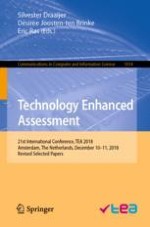2019 | OriginalPaper | Buchkapitel
Quizbot: Exploring Formative Feedback with Conversational Interfaces
verfasst von : Bharathi Vijayakumar, Sviatlana Höhn, Christoph Schommer
Erschienen in: Technology Enhanced Assessment
Aktivieren Sie unsere intelligente Suche, um passende Fachinhalte oder Patente zu finden.
Wählen Sie Textabschnitte aus um mit Künstlicher Intelligenz passenden Patente zu finden. powered by
Markieren Sie Textabschnitte, um KI-gestützt weitere passende Inhalte zu finden. powered by
